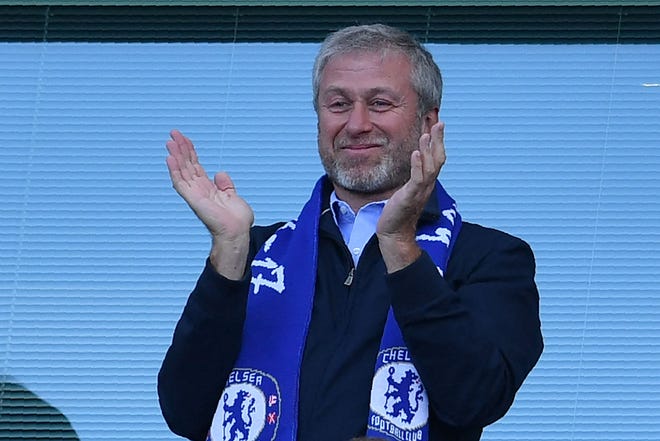
This article is more than
4 year old
LONDON (AP) — Faced with the threat of financial sanctions targeting Russians, Chelsea owner Roman Abramovich confirmed Wednesday he is trying to sell the Premier League club he turned into an elite trophy-winning machine with his lavish investment.
Abramovich’s trophy asset made him a high-profile target for politicians demanding he be included among wealthy and influential Russians hit with British sanctions after a week of Russia’s war on Ukraine.
“Please know that this has been an incredibly difficult decision to make, and it pains me to part with the club in this manner,” Abramovich said in a statement. “However, I do believe this is in the best interest of the club.”
UKRAINE INVASION: Keep up with the latest news
RUSSIANS OUT: Sports ban Russia from competitions amid invasion of Ukraine
It is one of the most stunning business repercussions of President Vladimir Putin’s decision to invade Russia’s neighbor.
One potential buyer had already gone public to reveal Abramovich was trying to sell with a price tag of at least $2.5 billion floated. Swiss billionaire Hansjorg Wyss claimed he “received an offer on Tuesday to buy Chelsea from Abramovich” along with three other people.
However, Abramovich insisted that “the sale of the club will not be fast-tracked but will follow due process.”
The billionaire oligarch said he will not be asking to be repaid 1.5 billion pounds ($2 billion) in loans he has granted the club during 19 years of injecting cash to elevate the team into one of the most successful in Europe. The set of every major trophy was completed last month when Chelsea won the Club World Cup.
“I have instructed my team to set up a charitable foundation where all net proceeds from the sale will be donated,” he said. “The foundation will be for the benefit of all victims of the war in Ukraine.”
Abramovich has faced calls to condemn Russia’s attack on Ukraine, which he so far has not done.

Parliamentary privilege had been used by Labour Party legislator Chris Bryant to claim in the House of Commons that Abramovich was already looking to sell London properties, speculating that “he’s terrified of being sanctioned.”
Abramovich has not commented on any attempts to seize his assets.
The speed of Abramovich’s pending exit from Chelsea is striking as he was trying to instigate a plan this past weekend to relinquish some control in order to keep the club under his ownership, announcing plans to shift the “stewardship and care” of the club to its foundation trustees.
“I hope that I will be able to visit Stamford Bridge one last time to say goodbye to all of you in person,” Abramovich said. “It has been a privilege of a lifetime to be part of Chelsea FC and I am proud of all our joint achievements. Chelsea Football Club and its supporters will always be in my heart.”
Chelsea had won the league title only once – in 1955 – when Abramovich bought the club in 2003. Helped by a number of expensive signings, the club won the Premier League title two years later and has added four more since then, most recently in 2017.
The haul of 18 trophies in 19 years also includes two Champions League titles and the Club World Cup success he was in Abu Dhabi to witness last month.
Abramovich rarely speaks publicly but did give an interview to Forbes last year, in part explaining the purchase of Chelsea in 2003 for 140 million pounds including 75 million pounds of debt.
“In hindsight, especially with the public profile it would bring me, maybe I would have thought differently about owning a club,” Abramovich was quoted as telling Forbes. “But, at the time, I just saw this incredible game and that I wanted to be a part of that in one way or another.”
His last public visit to a match at Stamford Bridge was last year after also hosting Israeli President Isaac Herzog at the stadium in November.
Abramovich has not had a British visa since 2018 when a renewal application was taking longer than usual to go through and was withdrawn. That came at a time when Britain pledged to review the long-term visas of rich Russians in the aftermath of the poisonings of Russian former spy Sergei Skripal and his daughter in the English city of Salisbury. Britain blamed Russia for the pair’s exposure to a nerve agent, an allegation Moscow denies.
In 2012, a High Court judge in London highlighted Abramovich’s connections to Putin in a ruling related to a legal battle. Judge Elizabeth Gloster said Abramovich had “very good relations” and “privileged access” to Putin though adding he could not “pull the presidential strings.”
Abramovich has denied taking any orders from Putin.
Sign up for Ukraine updates: We'll email you the latest news once a day.